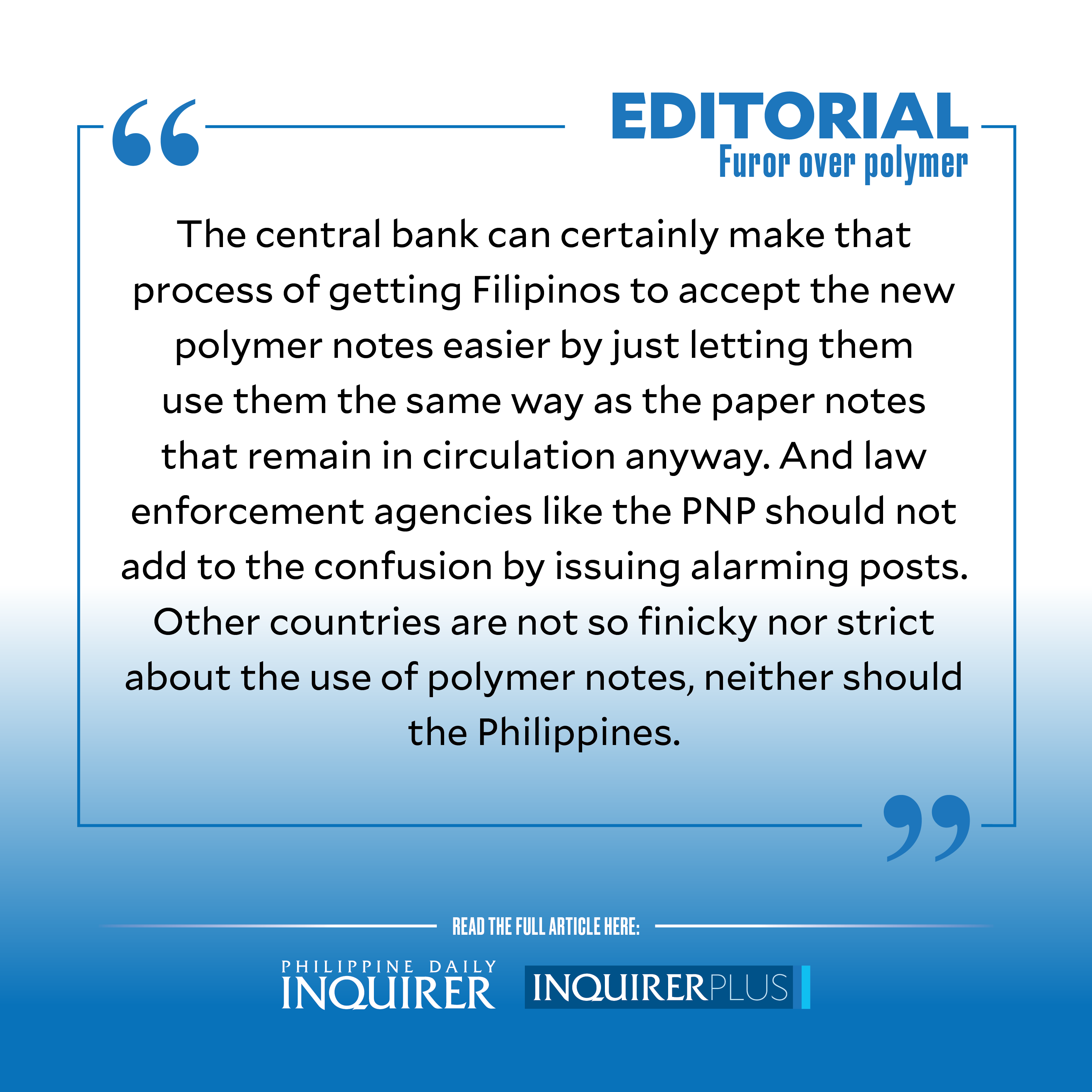
Social media was whipped into a frenzy last weekend by a frustrated shopper’s post that a mall cashier refused to accept her P1,000 polymer banknote because it was folded and slightly creased, making it unacceptable as legal tender supposedly in accordance with the proper handling guidelines of the notes by the Bangko Sentral ng Pilipinas (BSP).
The widely shared post immediately launched a flurry of humorous memes with one showing framed banknotes, the first batch of which was issued by the BSP just last April as part of efforts to transition from the abaca-cotton blend paper notes to the “smarter, cleaner, and stronger” polymer version similar to those used in 57 countries including the United Kingdom, Canada, and Australia where the new peso bills were manufactured.
But beyond the humor are pointed and valid criticisms of the seemingly over-the-top rules on the handling of polymer notes that the BSP took great pains to explain were more sturdy than the long-used paper notes that have managed to survive, despite all manner of abuse such as crumpling and folding, especially in public transportation and in wet markets.
The BSP did say that these polymer banknotes were “tough,” but even then, they should still be “valued and handled with care.” Thus, the BSP enjoined Filipinos to not “excessively fold, crease, or crumple” the banknotes as doing so could “leave permanent fold marks.” Users were also told not to staple the notes nor use rubber bands to keep them together, and instead use paper bands.
Many Filipinos frowned on the guidelines, lambasting them for being overkill, considering how Filipinos typically use their banknotes. And the BSP’s cause was not helped by new BSP Gov. Felipe Medalla’s “absurd” suggestion that Filipinos “adjust” to the new polymer banknotes by getting longer wallets.
“Dapat ang wallet, singhaba ng pera para hindi i-fold,” Medalla said in a television interview, going so far as to say that women will have a much easier time with the banknotes since they have handbags.
And as if these were not enough, a supposed office of the Philippine National Police in Central Luzon mentioned these guidelines in handling polymer banknotes in a social media post, and warned violators that they face a maximum fine of P20,000 and a jail term of at least five years.
Using the polymer notes was thus dismissed as such a hassle—and could even land someone in jail—that Sen. Koko Pimentel demanded the BSP to stop the issuance and production of the “impractical” polymer bills altogether, even if they are touted as an improvement because they promise to be more secure and sustainable; more hygienic and sanitary as well as more durable and cost-effective than the paper banknotes as they are expected to last two to five times longer than the paper bills.
Pimentel also urged the Senate to inquire into the BSP’s “absolutely absurd” decision to shift to polymer in the first place, saying that it is not only “detrimental” to the livelihood of the local abaca farmers but also “impractical to many Filipinos who are used to storing their bills in their pockets, purses, or their tri-fold wallets.”
“Our bills should be designed in such a way that they can withstand a minimum amount of abuse like crumpling and folding. Parang gusto pa yata nila ilagay sa frame yung bills para kunwari matibay,” Pimentel said.
To its credit, the BSP has not been deaf to the mounting criticisms and immediately sought to assure the public that folded banknotes, whether paper or polymer, are legal tender and should be accepted by retailers and banks for day-to-day payment transactions. And yes, the bills can be kept in the typical bi-fold wallet.
As it stands, the BSP is sticking to its timetable to “adopt global best practices” and phase in the use of polymer notes, starting with the P1,000 banknote, which is the most widely used denomination accounting for 30 percent of currency in circulation, and also the first note in a new series of Philippine currency that will focus on the Philippines’ rich flora and fauna.
The central bank can undoubtedly make that process of getting Filipinos to accept the new polymer notes easier by just letting them use them the same way as the paper notes that remain in circulation anyway. And law enforcement agencies like the PNP should not add to the confusion by issuing alarming posts.
Other countries are not so finicky nor strict about the use of polymer notes, neither should the Philippines.

